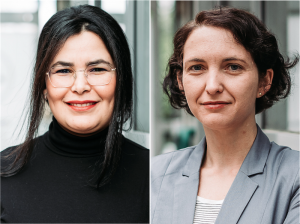
New antibiotic producers described: Old DSMZ treasures with new potential
Researchers name newly described bacteria exclusively after female scientists
BRAUNSCHWEIG, GERMANY, November 27, 2024 /EINPresswire.com/ -- Researchers led by Dr Imen Nouioui and Prof. Dr Yvonne Mast from the Department Bioresources for Bioeconomy and Health Research at the Leibniz Institute DSMZ-German Collection of Microorganisms and Cell Cultures GmbH have characterised 28 actinomycetes and investigated their biotechnological potential. The results of the study show that all actinomycetes have an inhibiting effect against a panel of test bacteria and yeasts. The researchers have now published their findings in the renowned journal Current Research in Microbial Sciences.
Many actinomycetes hide a biotechnological potential
Actinomycetes are bacteria that are known to produce bioactive substances. Two thirds of the antibiotics in use were originally isolated from these bacteria. The actinomycetes now being investigated were deposited in the DSMZ collection decades ago, but have not yet been characterised in detail. In their study, the researchers investigated the natural compound synthesis potential of 28 actinomycetes and were able to prove that they have an inhibiting effect against selected other microorganisms. These include clinically relevant antibiotic-resistant bacteria that are on the World Health Organisation's Bacterial Priority Pathogens List. The DSMZ's actinomycetes collection contains more than 6,000 strains, some of which have not yet been further analyzed. ‘Our study shows that we still have many undiscovered treasures at our institute,’ summarises microbiologist Yvonne Mast. ‘The search for new active substances is extremely important, particularly in light of the growing problem of antibiotic resistance. We are conducting thorough research on these strains to create added value on them and, among other goals, provide producers of potentially new active substances to the scientific community.’
Naming the newly described bacteria after female scientists
As part of the study, the actinomycetes were analysed using state-of-the-art methods. Based on the results, 26 actinomycetes were fully described and formally named for the first time. ‘This work is particularly important as it underscores the critical need for correctly identifying and classifying strains, while also highlighting the invaluable role of culture collections in preserving interesting strains that can benefit a wide range of the scientific community. Closing the gender gap in taxonomy was a key priority for the researchers. Historically, most bacteria have been named after male researchers, while female researchers have rarely been considered in the past. Therefore, the 26 newly described actinomycetes were all named in honor of female scientists who have made significant contributions to the field of microbiology.
Original publication
Nouioui, I., Boldt, J., Zimmermann, A., Makitrynskyy, R., Pötter, G., Jando, M., Döppner, M., Kirstein, S., Neumann-Schaal, M., Gomez-Escribano, J.P., Nübel, U., Mast Y. (2024) Biotechnological and pharmaceutical potential of twenty-eight novel type strains of Actinomycetes from different environments worldwide. Current Research in Microbial Sciences: 100290. DOI: 10.1016/j.crmicr.2024.100290
About the Leibniz Institute DSMZ
The Leibniz Institute DSMZ-German Collection of Microorganisms and Cell Cultures is the world's most diverse collection of biological resources (bacteria, archaea, protists, yeasts, fungi, bacteriophages, plant viruses, genomic bacterial DNA as well as human and animal cell lines). Microorganisms and cell cultures are collected, investigated and archived at the DSMZ. As an institution of the Leibniz Association, the DSMZ with its extensive scientific services and biological resources has been a global partner for research, science and industry since 1969. The DSMZ was the first registered collection in Europe (Regulation (EU) No. 511/2014) and is certified according to the quality standard ISO 9001:2015. As a patent depository, it offers the only possibility in Germany to deposit biological material in accordance with the requirements of the Budapest Treaty. In addition to scientific services, research is the second pillar of the DSMZ. The institute, located on the Science Campus Braunschweig-Süd, accommodates more than 89,000 bioresources and has almost 230 employees. www.dsmz.de
The Leibniz Association
The Leibniz Association connects 96 independent research institutions that range in focus from natural, engineering and environmental sciences to economics, spatial and social sciences and the humanities. Leibniz Institutes address issues of social, economic and ecological relevance. They conduct basic and applied research, including in the interdisciplinary Leibniz Research Alliances, maintain scientific infrastructure, and provide research-based services. The Leibniz Association identifies focus areas for knowledge transfer, particularly with the Leibniz research museums. It advises and informs policymakers, science, industry and the general public. Leibniz institutions collaborate intensively with universities – including in the form of Leibniz ScienceCampi – as well as with industry and other partners at home and abroad. They are subject to a transparent, independent evaluation procedure. Because of their importance for the country as a whole, the Leibniz Association Institutes are funded jointly by Germany’s central and regional governments. The Leibniz Institutes employ around 21,300 people, including 12,200 researchers. The financial volume amounts to 2,2 billion euros. www.leibniz-gemeinschaft.de
PhDr. Sven David Mueller, M.Sc.
Leibniz-Institut DSMZ
email us here
Visit us on social media:
Facebook
X
LinkedIn
Instagram
YouTube
Distribution channels: Chemical Industry, Environment, Healthcare & Pharmaceuticals Industry, Science, World & Regional
Legal Disclaimer:
EIN Presswire provides this news content "as is" without warranty of any kind. We do not accept any responsibility or liability for the accuracy, content, images, videos, licenses, completeness, legality, or reliability of the information contained in this article. If you have any complaints or copyright issues related to this article, kindly contact the author above.
Submit your press release

